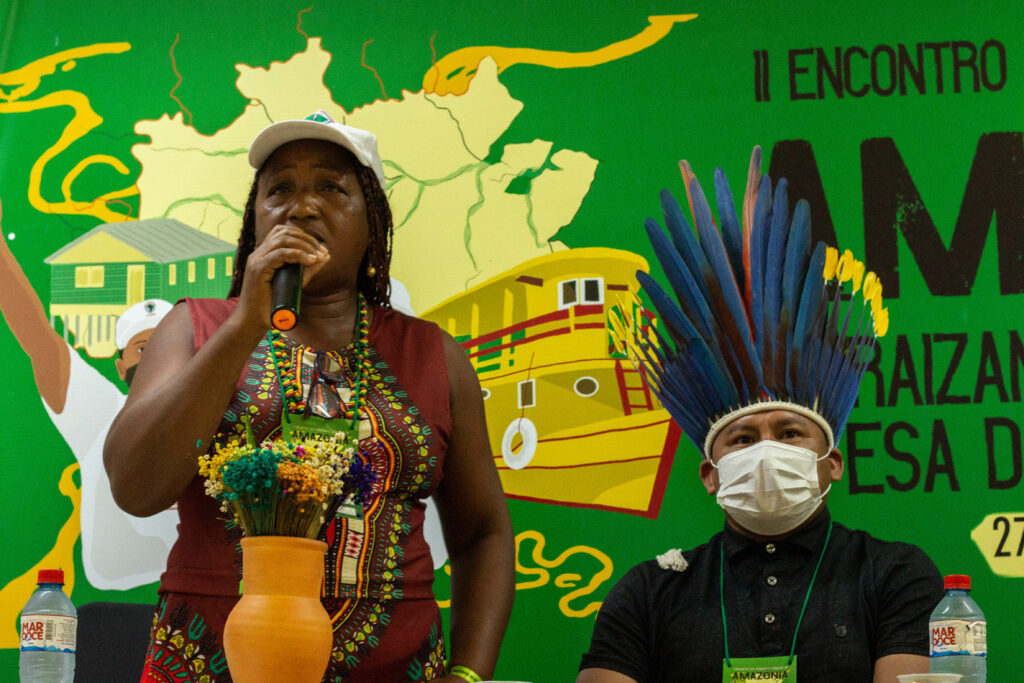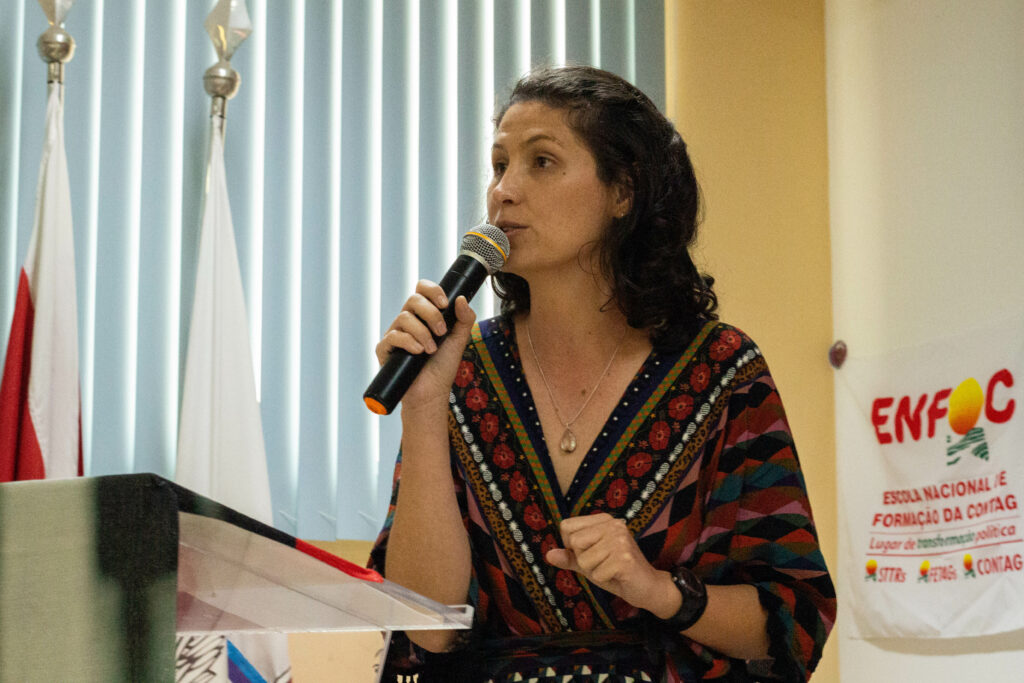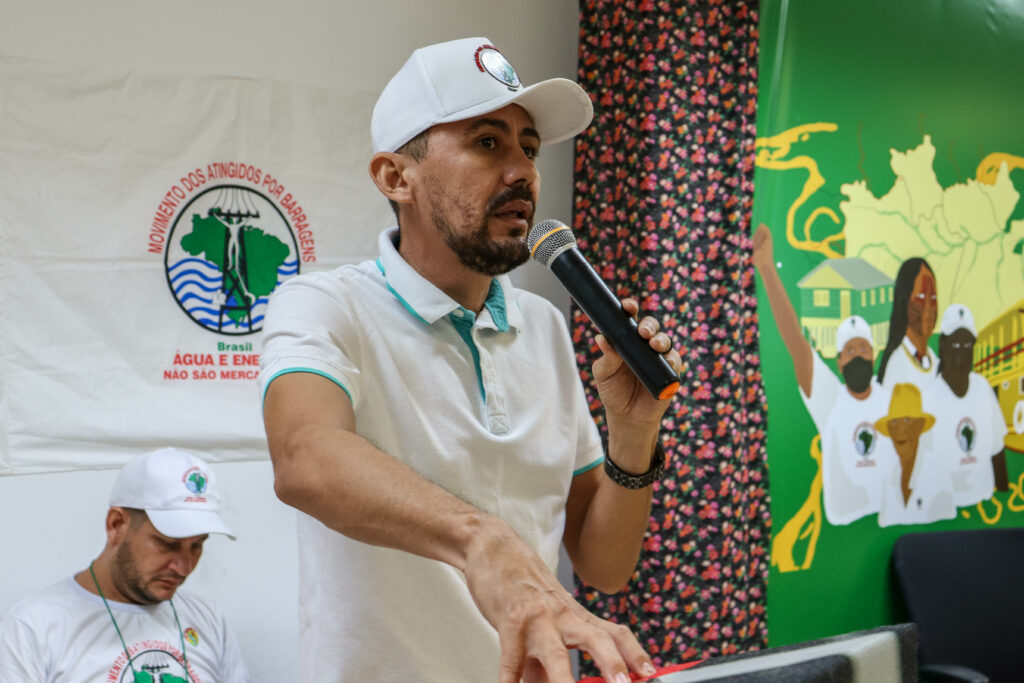II Amazon Rainforest Affected People meeting highlights the importance of a National Framework on Human Rights and Companies
In a meeting organized by MAB in Belém (PA), activists from the Movement and from different popular organizations defended the approval of a bill that creates a legal framework for the rights of affected people
Publicado 31/07/2022 - Actualizado 31/07/2022

“As humans, we have our rights, right? But these rights are not in our hands. We fight for them, but they don’t come. I have the right to a house, adequate food, drinking water, health care, and education”, claims Maria José Brito de Souza, leader of Quilombo de São José do Icatú, located in the municipality of Mocajuba (PA).
Maria José faces for the second time the fear of her community being affected by an enterprise. After having suffered the great impacts of the implementation of the Tucuruí Hydroelectric Power Plant in 1984, Maria now fears that the Tocantins River will suffer irreversible damages due to the implementation of the Araguaia-Tocantins Waterway. The licensing for the work was released, even without prior consultation with the indigenous people and communities affected by the project.
In cases like these, which violate the human rights of those affected people, which could be tackled with the approval of Bill (PL) 572/22, which creates a national framework on human rights and companies. The text, a historical demand of those affected people, establishes guidelines for the promotion of public policies for the prevention and repair of damages caused by dams throughout the country.
This was one of the topics discussed at 28, during the II Meeting of People Affected by Dams in Amazon Rainforest, which was organized by MAB in Belém (PA) and brought together about 300 affected people from the nine states of the Brazilian Amazon. The debate was promoted by the HOMA -Human Rights and Business centre at UFJF, which is responsible for one of the studies that supported the text of the PL.

The project is also the result of a collective discussion with researchers linked to the Universidade Federal de Juiz de Fora, MAB, the Central Única dos Trabalhadores (CUT), and the Friends of the Earth Brazil (ATBr). At the meeting, the doctoral student in Human Rights at the Universidade Federal do Paraná and representative of Homa, Tchenna Maso, said that, if approved, this project will be a pioneer in the world. “We have a major role in this issue in Brazil, precisely because we have seen a culture of impunity spread here. In other words, it pays for companies to violate human rights, because they will not be held accountable”. The researcher explained that, among other topics, the project establishes the obligations of governments and companies controlling dams and recognizes the rights of people affected by the projects concerning compensation, information, and consultancy from independent technical advisors, among others.
The Bill was presented in March 2022 at the Human Rights Commission of the Federal Senate and is currently being processed by the House Social Security Commission, where it awaits to be voted. “Society needs to understand the damage (of the dams), demand to defend the rights of those affected people and embrace this project,” said Tchenna.
During the debate, those affected people presented proposals on the subject to the parliamentarians present, such as Vivi Reis, federal deputy (PSOL/PA), and Lívia Duarte, councilor for PSOL in Belém. “These which they call big enterprises are destroying our country’s culture, life and future. Therefore, it is very important that we can follow the progress of the project (572/22) and follow it up as soon as it is approved, to guarantee its execution”, said Vivi.
How to measure the human losses caused by dams?

In his speech, Iury Paulino, a member of MAB`s national coordination, stimulated those present to discuss the extent of the impacts suffered by those affected people: “How to measure the problems that afflict those affected people? How to measure the value of the loss of beloved ones, of the loves of life, or of the life itself?”. Iury was affected by the Castanhão Dam, in Jaguaribara (CE). In his speech, he related the story of his family, which had a comfortable life thanks to their agricultural production but lost their land to the enterprise. The worst drama, however, was the death of the grandparents. After the forced displacement from the countryside to the city, the family went through several hardships and suffered from the distance from their lands, until Iury’s grandparents became extremely depressed and died.
The resident of Quilombo de São José, Maria Brito also suffered irreparable losses. She says that two sisters died intoxicated by the waste from the Tucuruí Power Plant. The contamination was discovered in Belém, from examinations after the death of many people from the Quilombo. During the construction period, those affected people discovered that during the cutting of vegetation, in the area of the dam, Agent Laranja, a highly toxic chemical defoliant used in the military, was used. Barrels with product residues were submerged, polluting the water and causing the death of people and animals and many diseases, such as acute intoxication and skin cancer in the surrounding residents.
In this sense, Iury reinforced the dimension of the transformations caused in the communities and the personal lives of those affected. “How do you calculate what the death of my grandfather Luiz and my grandmother Maria, called Dona Nenê by my family, represented? This is a dimension that is incalculable when thinking about indemnifying or repairing this. How do you calculate the losses of a community that has lived fifty, a hundred years in a certain place, has its loved ones there, and was forced to move? There is no way to calculate it.”
Iury also recalled that the affected areas have high rates of depression and suicide. “Imagine being a person who lives below a dam after having seen the ones in Brumadinho and Mariana break. How can you measure the suffering of such a person? I’ve seen partners whose children can’t sleep. It’s not just the dimension of what is material, it’s not just being without the house, it’s not just being without the land. Sometimes it doesn’t show up. But the sentimental dimension is very deep”, highlighted Iury.
The II Meeting of Affected of the Amazon RainForest is part of the program linked to the 10th Pan-Amazonian Social Forum, which takes place from July 28 to 31 at the Federal University of Pará (UFPA).

